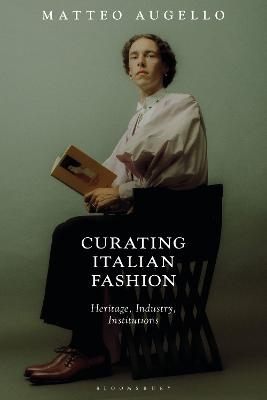
Curating Italian Fashion
Bloomsbury Visual Arts (Verlag)
978-1-350-23077-4 (ISBN)
- Titel ist leider vergriffen;
keine Neuauflage - Artikel merken
By contextualising fashion curation within Italy's economy, culture and art-historical tradition, Curating Italian Fashion unfolds the ties between the preservation of fashion heritage and corporate policies. It traces the shift of companies from sponsors to cultural producers and discusses the different uses of archives and exhibitions. Through the critical analysis of key examples such as Salvatore Ferragamo and Pitti Immagine, this book illustrates how the inevitable commercial interests underlying fashion curation can exist alongside the scholarly contribution of corporate initiatives. Most importantly, it defines the curatorial approaches developed by the involvement of the industry in fashion curation, thus providing an overarching interpretation of the characteristics of this practice in Italy.
Matteo Augello provides an unprecedented insight into the management of Italian fashion heritage and presents a comprehensive account of the development of fashion curation in Italy, drawing from archival records, existing literature and oral history. This book is essential reading for scholars, industry professionals and students interested in the intersections of curation, heritage, national identity and corporate cultural policies.
Matteo Augello lectures on fashion heritage and research methods at UK and Italian universities, alongside his work with museums including the Fondazione Antonio Ratti in Italy and the Victoria and Albert Museum in London. He performs as Miss Bella Bird.
List of Figures
Preface
Acknowledgements
Introduction
a. Situating Italian fashion curation
b. Defining terminology
c. Structuring the book
Chapter 1: Constructing Italian fashion heritage
1.1 Renaissance as Italianness
1.2 The strategic use of the past
1.3 Fashion, heritage and artification
1.4 Fashion as Renaissance legacy
Chapter 2: Industry and corporate heritage in Italy
2.1 Corporate heritage: an Italian perspective
2.2 Investing in corporate heritage
2.3 Corporate cultural policies
2.3.1 Patronage
2.3.2 Sponsorship
2.3.3 Partnership
2.3.4 Investment
2.4 Industry and scholarship
Chapter 3: Corporate heritage and institutions
3.1 Corporate foundations
3.2 Collecting corporate heritage
3.2.1 Corporate archives
3.2.2 Corporate collections
3.3 Corporate museums
3.4 Exhibiting corporate heritage
3.5 Researching corporate heritage
3.6 Interpreting corporate heritage
Chapter 4: A history of fashion curation in Italy
4.1 The beginnings (1900s-1940s)
4.2 The study of historical textiles and fashion (1950s-1970s)
4.2.1 CIAC, the International Centre of the Arts and Costume
4.2.2 Textiles and fashion at CIAC
4.2.3 CIAC in the 1960s
4.2.4 Fashion studies in Milan in the 1970s
4.3 Moving towards contemporary fashion (1980s-1990s)
4.3.1 CISST, the Italian Centre for the Study of the History of Textiles
4.3.2 The 1981 exhibition at the Museo Poldi Pezzoli in Milan
4.3.3 The 1985 retrospective on Salvatore Ferragamo
4.3.4 The 1990 conference on ready-to-wear history
4.3.5 The relaunch of Florence as a fashion capital
4.3.6 The 1996 Biennale di Firenze
4.4 The lead of corporate institutions (2000s-2010s)
4.4.1 The Fondazione Pitti Immagine Discovery
4.4.2 Exhibitions as promotional tools
4.4.3 The increasing importance of fashion heritage
4.4.4 Online archives
4.4.5 Recent developments
Chapter 5: Industry and curation: a critical commentary
5.1 Companies as sponsors
5.2 Companies as cultural producers
5.3 Curating corporate heritage
5.4 Managing corporate and civic needs
Concluding remarks
Notes
Reference list
Index
| Erscheinungsdatum | 07.11.2022 |
|---|---|
| Zusatzinfo | 19 bw illus |
| Verlagsort | London |
| Sprache | englisch |
| Maße | 156 x 234 mm |
| Themenwelt | Kunst / Musik / Theater ► Design / Innenarchitektur / Mode |
| Kunst / Musik / Theater ► Kunstgeschichte / Kunststile | |
| Geschichte ► Allgemeine Geschichte ► Neuzeit (bis 1918) | |
| Sozialwissenschaften | |
| ISBN-10 | 1-350-23077-4 / 1350230774 |
| ISBN-13 | 978-1-350-23077-4 / 9781350230774 |
| Zustand | Neuware |
| Informationen gemäß Produktsicherheitsverordnung (GPSR) | |
| Haben Sie eine Frage zum Produkt? |
aus dem Bereich


